coleslaw
Active Member
- Joined
- Oct 3, 2013
- Messages
- 596
- Reaction score
- 0
Re: Seaport Square (Formerly McCourt Seaport Parcels)
Quoting Easterbrook on climate change is like quoting Glen Beck on the economy (neither has any idea what they are talking about). 99% of scientists disagree with him. He is funded by institutions that have a vested interest in perpetuating mistruth about climate change.
Colelaw -- if I was you -- I would be seriously worried about a globally cooler place at least for the next few decades
The planet has not warmed in 18 years -- the models are broken and can not be reliaed upon for prediction -- our recourse is to look at the past -- and what we see both near term and long-term is cooling is coming
see for example
" Global Cooling is Here
Evidence for Predicting Global Cooling for the Next Three Decades
By Prof. Don J. Easterbrook
Global Research, June 28, 2014
Department of Geology, Western Washington University and Global Research
originally published November 2008
INTRODUCTION
Despite no global warming in 10 years [[[ now 18 and counting] and recording setting cold in 2007-2008, the Intergovernmental Panel on Climatic Change (IPCC) and computer modelers who believe that CO2 is the cause of global warming still predict the Earth is in store for catastrophic warming in this century. IPCC computer models have predicted global warming of 1° F per decade and 5-6° C (10-11° F) by 2100 (Fig. 1), which would cause global catastrophe with ramifications for human life, natural habitat, energy and water resources, and food production. All of this is predicated on the assumption that global warming is caused by increasing atmospheric CO2 and that CO2 will continue to rise rapidly.
Figure 1. A. IPCC prediction of global warming early in the 21st century. B. IPCC prediction of global warming to 2100. (Sources: IPCC website) [not shown]
However, records of past climate changes suggest an altogether different scenario for the 21st century. Rather than drastic global warming at a rate of 0.5 ° C (1° F) per decade, historic records of past natural cycles suggest global cooling for the first several decades of the 21st century to about 2030, followed by global warming from about 2030 to about 2060, and renewed global cooling from 2060 to 2090 (Easterbrook, D.J., 2005, 2006a, b, 2007, 2008a, b); Easterbrook and Kovanen, 2000, 2001). Climatic fluctuations over the past several hundred years suggest ~30 year climatic cycles of global warming and cooling, on a general rising trend from the Little Ice Age "

and

and

Indeed if you want to put it in context -- "Hide the Decline" -- aka aka the Climategate e-mails are akin to "Americans are stupid" -- aka the Grubergate videos -- they both expose the mendacity and arrogance of the Government - Academic Complex -- mediated and exacerbated by a math and scientifically ignorant media unable to challenge the statements of the players
Ultimately guided by Holmes -- we should follow the money and see who is feeding at the public trough
Quoting Easterbrook on climate change is like quoting Glen Beck on the economy (neither has any idea what they are talking about). 99% of scientists disagree with him. He is funded by institutions that have a vested interest in perpetuating mistruth about climate change.






